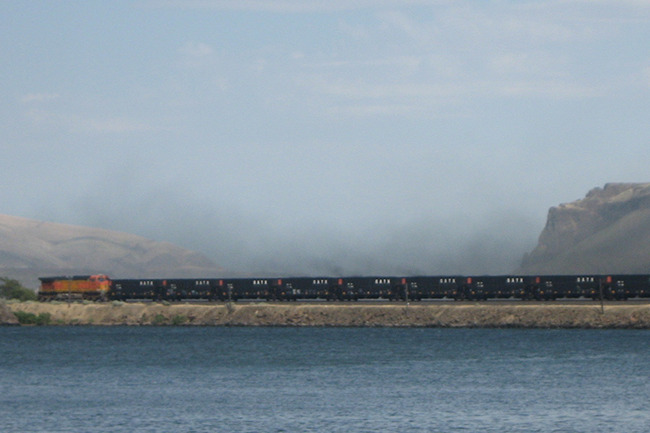By Steve Law, Portland Tribune
BNSF Railway will pay $1 million to mitigate the cost of pollution in Washington state waterways caused by coal emitted from its open-topped rail cars, under a final consent decree announced Friday in a lawsuit settlement with environmental groups.
BNSF earlier agreed to pay for a study about adding rail car covers to coal and petcoke trains, which are now used to ship the fossil fuel on open-bed trains from Wyoming and Montana to the Northwest, including tracks along the Columbia River Gorge.
The decree was filed Friday, March 3, with U.S. District Court Judge John Coughenour in Seattle.
This brings to a close a lawsuit filed by Sierra Club, Puget Soundkeeper, Columbia Riverkeeper, Spokane Riverkeeper, RE Sources for Sustainable Communities, Natural Resources Defense Council and Friends of the Columbia Gorge.
"This settlement finally forces BNSF to take responsibility for their impact on our water, clean up the mess they made and take steps to prevent similar pollution in the future," said Cesia Kearns, deputy regional campaign director for the Sierra Club's Beyond Coal campaign, in a prepared statement.
During a week-long trial last November, scientists testified that at least a million coal particles per second fly off each rail car while in transit, leading to mercury, arsenic and other pollutants in nearby rivers, lakes and the ocean.
The cleanups funded by BNSF will take place at the White Salmon River's confluence with the Columbia River, the confluence of Rock Creek and the Columbia, Horsethief Lake, Drano Lake Rail Bridge, and the causeway near Murdock, Washington.
BNSF released a statement saying the settlement will allow it to continue to work on the coal dust problem without the distraction of a prolonged legal battle.
"It is important to note the settlement reflects that BNSF denies any violations of the Clean Water Act and that BNSF has implemented a regime requiring the use of the best commercially available technology to address coal dust as upheld by the Surface Transportation Board, the federal agency with oversight over rail industry practices," said Courtney Wallace, the company's regional public affairs director, in a prepared statement.
She noted that the company will study the best available prototypes for covering rail cars for its coal trains. However, "the settlement does not require a particular outcome or conclusion with respect to car covers," Wallace said. "The study results will be driven by data and technical analysis."

